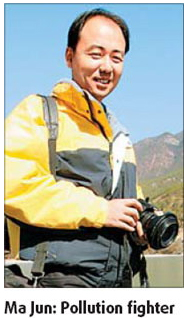For a company, a brand matters the most.
Environmentalist Ma Jun, who is well aware of the dictum, has used it to pressure polluters to mend their ways.
He created a website to name and shame companies, and even local governments, that pollute the environment.
"
Companies which may ignore fines or other punishments cannot afford their brands being blacklisted," Ma said Thursday.
"The pressure exerted can help stop pollution at its origin, because the public will penalize polluters by shunning their products."
On Saturday, the 39-year-old was selected as one of 50 people - including four Chinese - who could save the planet by The Guardian, a leading British newspaper, because of his green efforts in the past decade.
"The award was a surprise to me, and the honor belongs to our team," said Ma, who in 2006 set up the Institute of Public and Environmental Affairs, a Beijing-based non-governmental organization with five staff members.
The awards to the four Chinese send out a message, Ma said.
"It shows that the world cares about the environment in China, and how this developing country can play a role in solving environmental problems."
The other Chinese on the list are Pan Yue, 47, vice-minister of the State Environmental Protection Administration; Jia Zhangke, 37, actor/director credited with raising public awareness of the environment; and Shi Zhengrong, 44, a scientist who owns Suntech Power, one of the world's 10 biggest solar panel producers.
Ma said: "The new interaction between the government, public, enterprises and NGOs will benefit environment protection in China."
As one of the leaders of environmental NGOs, which are estimated at about 3,000 in the country, Ma said the NGOs have made up for what the government may not be doing very well, such as keeping the public better informed about polluters.
On its part, the government has set in place a series of laws or regulations regarding the environment since 2003, which have enhanced public awareness of the environment.
These efforts have contributed significantly to climate change mitigation, he said.
Ma's website features a list of polluters based on government data - placed on two web pages widely reported by the media.
On the blacklist are more than 10,000 water-polluting enterprises and over 4,000 that pollute air.
Up to now, about 50 enterprises have approached Ma, explaining their situation and promising to clean up their act.
Eight enterprises have asked independent environmental groups to audit their environmental management system and pollution control facilities. Of them, two have been removed from the blacklist after they passed the audits.
Ma is no stranger to lobbyists from blacklisted enterprises.
"Some come and say they want to support our project. I tell them to check their pollution first."
But given the fact that 15,000 enterprises remain on the blacklist, "domestic and foreign-funded enterprises in China still have a long way to go to come clean," he said.
His goal for this year: First, to create a database that categorizes products by type and industry.
"Consumers can check online the products they want to buy and select products from clean companies."
Second, he wants to set up a new list of polluting suppliers as a reference for big companies.
"I hope big names such as Wal-Mart could one day stand up and say: 'We don't buy from polluting suppliers'."
Ma, a former researcher with Hong Kong-based South China Morning Post, published a book, China's Water Crisis, in 1999. He shifted from journalism to water protection during his field trips to polluted rivers and lakes in the 1990s.
"China has been facing rising challenges in terms of water shortages and pollution," he said.
About 400 of 600 cities lack water, and water in about 30 percent of waterways is neither drinkable nor suitable for irrigation.
About 300 million farmers do not have accesses to safe drinking water, according to government figures.
(China Daily January 11, 2008)






